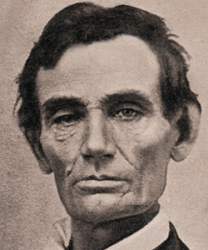Record Data
Source citation
"A House Divided'': Speech at Springfield, Illinois in Roy P. Basler, ed., The Collected Works of Abraham Lincoln (8 vols., New Brunswick, NJ: Rutgers University Press, 1953), 2: 461-469, http://quod.lib.umich.edu/l/lincoln/.
Type
Speech
Date Certainty
Exact
Transcriber
Transcription adapted from The Collected Works of Abraham Lincoln (1953), edited by Roy P. Basler
Adapted by Matthew Pinsker, Dickinson College
Transcription date
Transcription
The following text is presented here in excerpted form. Some sections have been removed, as indicated by ellipses, for space. Spelling and typographical errors have been preserved as in the original.
Mr. PRESIDENT and Gentlemen of the Convention.
If we could first know where we are, and whither we are tending, we could then better judge what to do, and how to do it.
We are now far into the fifth year, since a policy was initiated, with the avowed object, and confident promise, of putting an end to slavery agitation.
Under the operation of that policy, that agitation has not only, not ceased, but has constantly augmented.
In my opinion, it will not cease, until a crisis shall have been reached, and passed.
“A house divided against itself cannot stand.”
I believe this government cannot endure, permanently half slave and half free.
I do not expect the Union to be dissolved---I do not expect the house to fall---but I do expect it will cease to be divided.
It will become all one thing, or all the other.
Either the opponents of slavery, will arrest the further spread of it, and place it where the public mind shall rest in the belief that it is in course of ultimate extinction; or its advocates will push it forward, till it shall become alike lawful in all the States, old as well as new---North as well as South.
…We shall lie down pleasantly dreaming that the people of Missouri are on the verge of making their State free; and we shall awake to the reality, instead, that the Supreme Court has made Illinois a slave State.
To meet and overthrow the power of that dynasty, is the work now before all those who would prevent that consummation.
That is what we have to do.
But how can we best do it?
There are those who denounce us openly to their own friends, and yet whisper us softly, that Senator Douglas is the aptest instrument there is, with which to effect that object. They do not tell us, nor has he told us, that he wishes any such object to be effected. They wish us to infer all, from the facts, that he now has a little quarrel with the present head of the dynasty; and that he has regularly voted with us, on a single point, upon which, he and we, have never differed.
They remind us that he is a very great man, and that the largest of us are very small ones. Let this be granted. But “a living dog is better than a dead lion.” Judge Douglas, if not a dead lion for this work, is at least a caged and toothless one. How can he oppose the advances of slavery? He don't care anything about it. His avowed mission is impressing the “public heart” to care nothing about it….
… Now, as ever, I wish to not misrepresent Judge Douglas' position, question his motives, or do ought that can be personally offensive to him.
Whenever, if ever, he and we can come together on principle so that our great cause may have assistance from his great ability, I hope to have interposed no adventitious obstacle.
But clearly, he is not now with us---he does not pretend to be---he does not promise to ever be.
Our cause, then, must be intrusted to, and conducted by its own undoubted friends---those whose hands are free, whose hearts are in the work---who do care for the result.
Two years ago the Republicans of the nation mustered over thirteen hundred thousand strong.
We did this under the single impulse of resistance to a common danger, with every external circumstance against us.
Of strange, discordant, and even, hostile elements, we gathered from the four winds, and formed and fought the battle through, under the constant hot fire of a disciplined, proud, and pampered enemy.
Did we brave all then, to falter now?---now---when that same enemy is wavering, dissevered and belligerent?
The result is not doubtful. We shall not fail---if we stand firm, we shall not fail. Wise councils may accelerate or mistakes delay it, but, sooner or later the victory is sure to come.



